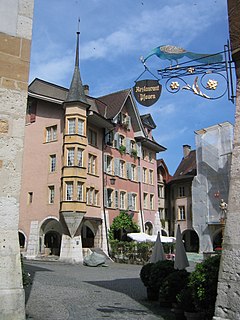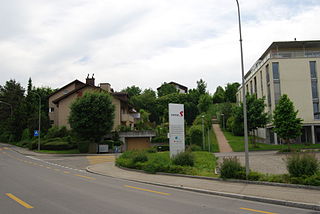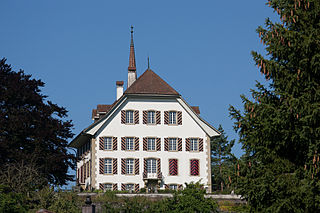
The canton of Bern or Berne is one of the 26 cantons forming the Swiss Confederation. It is composed of ten districts and its capital city is Bern which is also the federal city of Switzerland. The bear is the heraldic symbol of the canton, displayed on a red-yellow background.

Biel/Bienne is a town and a municipality in the Biel/Bienne administrative district in the canton of Bern in Switzerland.

Kappelen is a municipality in the Seeland administrative district in the canton of Bern in Switzerland.

Port is a municipality in the canton of Bern in Switzerland, located in the Biel/Bienne administrative district.

Safnern is a municipality in the Biel/Bienne administrative district in the canton of Bern in Switzerland.

Seeland is a region in Switzerland, at the south-eastern foot of the mountain range of the Jura Mountains containing the 3 Lakes of Morat, Neuchâtel, and Bienne (Biel). In previous eras, it was the floodplain of the Aare and was thus swampy. After the huge hydrological works Jura water correction, the area drained out and could support more cultivation. Seeland is one of the most important regions in Switzerland for growing vegetables, particularly in the Grand Marais.

Nidau is a municipality in the Biel/Bienne administrative district in the canton of Bern in Switzerland.

Orpund is a municipality in the Biel/Bienne administrative district in the canton of Bern in Switzerland.

Scheuren is a municipality in the Biel/Bienne administrative district in the canton of Bern in Switzerland.

Tüscherz-Alfermée, Daucher-Alfermée in French, was a municipality in the district of Nidau in the Swiss canton of Bern. On 1 January 2010 the municipalities of Tüscherz-Alfermée and Twann merged into the municipality of Twann-Tüscherz.

Wiedlisbach is a municipality in the Oberaargau administrative district in the canton of Bern in Switzerland.
The Guglers were a body of mostly English and French knights who as mercenaries invaded Alsace and the Swiss plateau under the leadership of Enguerrand VII de Coucy during the Gugler War of 1375.

Erlach Abbey or St. Johannsen Abbey was a Benedictine monastery in Gals, Canton of Bern, Switzerland.
Seeland District in the Canton of Bern was created on 1 January 2010. It is part of the Seeland administrative region. It contains 42 municipalities with an area of 334.14 km2 (129.01 sq mi) and a population of 76,052.

Rüti Monastery was a former Premonstratensian monastery, founded in 1206 and suppressed in 1525 on occasion of the Reformation in Zürich, situated in the municipality of Rüti in the canton of Zürich, Switzerland. The monastery's church was the final resting place of the Counts of Toggenburg, among them Count Friedrich VII and 13 other members of the Toggenburg family, and other noble families. Between 1206 and 1525, the monastery comprised 14 incorporated churches and the owner of extensive lands and estates at 185 localities.

Nidau Castle is a castle in the municipality of Nidau of the Canton of Bern in Switzerland. It is a Swiss heritage site of national significance.

Riggisberg Castle is a castle in the municipality of Riggisberg of the canton of Bern in Switzerland.
Ratpert of St Gallen was a scholar, writer, chronicler and poet at the Abbey of Saint Gall. He wrote in Medieval Latin and in Old High German.

Münster is one of the two main churches of the old town of the Swiss city of Schaffhausen. First built in 1064 AD as a Romanesque Basilica of the then Benecdictine Kloster Allerheiligen, it was rebuilt several times, and became in 1524 the Reformed Church of the city of Schaffhausen.

Wiedlisbach Castle is a former tower house and defensive tower in the municipality of Wiedlisbach of the Canton of Bern in Switzerland.


















